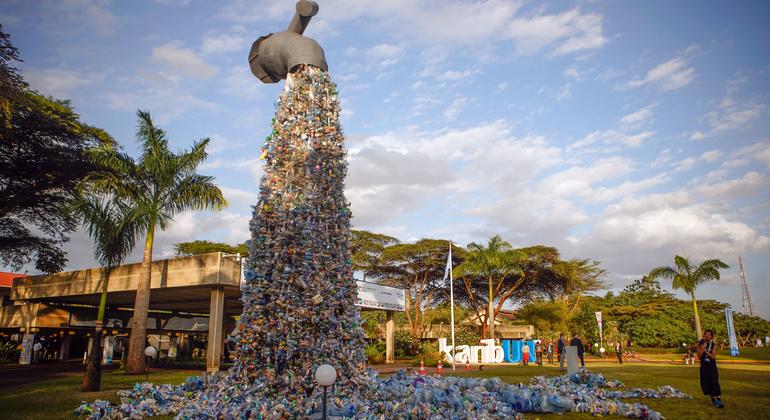The recent meeting held by the United Nations Environmental Programme (UNEP) comes after two years of intense intergovernmental negotiations aimed at crafting a legally binding global agreement to combat plastic pollution in both land and marine environments. This swift pace of negotiations is uncommon in the world of diplomacy, where agreements can often take decades to materialize.
UN Secretary-General António Guterres highlighted the urgent need for action in his video message to the delegates, emphasizing that the world is currently “drowning in plastic pollution.” With an annual production of 460 million tonnes of plastic, much of which is quickly discarded, the Secretary-General warned of the dire consequences if the issue is not addressed promptly. He predicted that by 2050, there could be more plastic than fish in the ocean, and microplastics in our bloodstreams are already causing health problems that are only beginning to be understood.
Despite these alarming statistics, there is cautious optimism surrounding the possibility of a groundbreaking agreement. UNEP Executive Director Inger Anderson described the current moment as “the moment of truth” and stressed the importance of taking decisive action. She noted that no one wants to see plastic littering their shores or circulating within their bodies, and emphasized the widespread support for a global treaty on plastic pollution.
Over 170 countries and 600 observer organizations have participated in the talks in Busan, South Korea, where President Yoon Suk Yeol urged delegates to work towards zero plastic pollution for the sake of future generations. The President highlighted the detrimental impact of plastic waste on oceans and rivers, calling for solidarity among Member States to finalize a treaty on plastic pollution.
The discussions in Busan mark the fifth Intergovernmental Negotiating Committee (INC-5) meeting aimed at developing an international legal instrument to address plastic pollution, including in marine environments. The process began 1,000 days ago in Uruguay and has now culminated in a critical juncture where global leaders must act decisively to combat the growing crisis.
UNEP chief Inger Anderson underscored the long-lasting impact of plastic pollution, noting that some plastics can take up to 1,000 years to decompose. Even when they do break down, they create smaller particles that persist in the environment, causing harm to ecosystems, urban drainage systems, and potentially human health.
The urgency of the situation has led to a groundswell of support from various sectors, including waste pickers, civil society groups, businesses, indigenous peoples, and scientists. The finance sector has also shown a willingness to engage in global efforts to address plastic pollution, with the G20 leaders signaling their commitment to reaching a treaty by the end of the year.
As the negotiations continue in Busan, the world is watching with bated breath, hoping that global leaders will rise to the occasion and forge a historic agreement to tackle plastic pollution head-on. The stakes are high, but the potential for positive change is within reach if all parties come together in solidarity and commitment to a sustainable future for all.









